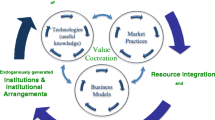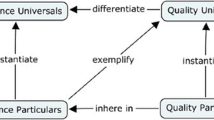Abstract
According to Vargo and Lusch (Journal of Marketing, 68:1–17, 2004a, Journal of Service Research, 6:324–335, b), service is the appropriate logic for marketing. For them, service is an interactive process of “doing something for someone” that is valued. More radically, goods also render service and have value-in-use. In this context service becomes the unifying purpose of any business relationship. This marketing world-view involves broadening and reframing what by convention counts as service and stands in opposition to 200 years of mainstream economic logic in explaining productive capacity. In our view they have succeeded in applying their scholarly thinking to old themes with synergistic results. Their thesis challenges marketing orthodoxy, and will in our view support much future innovation in both theoretical and practical terms.
Similar content being viewed by others
References
Aitken, R., Ballantyne, D., Osborne, P., & Williams, J. (2006). Introduction to the Special issue on the service-dominant logic of marketing: Insights from the Otago Forum. Marketing Theory, 6(3), 275–280.
Alderson, W. (1957). Marketing behavior and executive action: A functionalist approach to marketing theory. Homewood, Il.: Richard D. Irwin.
Ballantyne, D., & Varey, R. J. (2006a). Introducing a dialogical orientation to the service-dominant logic of marketing. In R. F. Lusch, & Vargo, S. L. (Eds.), Toward a service dominant logic of marketing: Dialog, debate and directions (pp. 224–235). Armonk, N.Y.: M. E. Sharpe.
Ballantyne, D., & Varey, R. J. (2006b). Creating value-in-use through marketing interaction: the exchange logic of relating, communicating and knowing. Marketing Theory, 6(3), 335–348.
Danner, P. L. (1976). Sympathy and exchangeable value: Keys to Adam Smith’s social philosophy. Review of Social Economy, 34, 317–331 (special issue on ‘The Social Economics of Adam Smith’).
Dixon, N. (2000). Common knowledge: How companies thrive by sharing what they know. Boston, Mass: Harvard Business School Press.
Ford, D., ed. (1997). Understanding business markets: Interaction, relationships and networks (2nd edn). New York: Dryden Press.
Grönroos, C. (2000). Service management and marketing: A customer relationship approach. Chichester: Wiley.
Gummesson, E. (1993). Quality management in service organizations. New York: International Service Quality Association (ISQA).
Gummesson, E. (1999). Total relationship marketing: Rethinking marketing management from 4Ps to 30Rs. Oxford: Butterworth-Heinemann
Holbrook, M. B., ed. (1999). Consumer value: A framework for analysis and research. London: Routledge.
Iacobucci, D., ed. (1996). Networks in marketing. Thousand Oaks: Sage.
Jacobs, J. (1992). Systems of survival: A dialogue on the moral foundations of commerce and politics. London: Hodder and Stoughton.
Lessem, R., & Palsule, S. (1997). Managing in four worlds: From competition to co-creation. London: Blackwell Business.
Levy, S. J. (1959). Symbols for sale. Harvard Business Review, 37(4), 117–124, July/August.
Lusch, R. F., & Vargo, S. L. eds. (2006a). Toward a service dominant logic of marketing: Dialog, debate and directions. Armonk, N.Y.: M. E. Sharpe.
Lusch, R. F., & Vargo, S. L. (2006b). Service-dominant logic: Reactions, reflections and refinements. Marketing Theory, 6(3), 281–288.
Nonaka, I., & Takeuchi, H. (1995). The knowledge-creating company: How Japanese companies create the dynamics of innovation. New York: Oxford University Press.
Normann, R., & Ramirez, R. (1993). From value chain to value constellation: Designing interactive strategy. Harvard Business Review, 71, 65–77, (July–August).
Payne, A., Ballantyne, D., & Christopher, M. (2005). A stakeholder approach to relationship marketing strategy: The development and use of the ‘Six Markets’ model. European Journal of Marketing, 39(7–8), 855–871.
Prahalad, C. K., & Ramaswamy, V. (2004). The future of competition: Co-creating unique value with customers. Boston, Mass: Harvard Business School Press.
Ramirez, R. (1999). Value co-production: Intellectual origins and implications for practice and research. Strategic Management Journal, 20, 49–65.
Sheth, J. N., & Sisodia, R. S., eds. (2006). Does marketing need reform? Armonk, N.Y.: M. E. Sharpe.
Smith, A. (1759/2002). The theory of moral sentiments. Cambridge: Cambridge University Press.
Smith, A. (1776/1970). The wealth of nations: Books I–III. London: Pelican Books.
Toffler, A. (1980). The third wave, New York: Bantam Books.
Varey, R. J., & Ballantyne, D. (2005). Relationship marketing and the challenge of dialogical interaction. Journal of Relationship Marketing, 4(3), 13–30.
Vargo, S. L., & Lusch, R. F. (2004a). Evolving to a new dominant logic for marketing. Journal of Marketing, 68(1), 1–17.
Vargo, S. L., & Lusch, R. F. (2004b). The four service marketing myths: Remnants of a goods-based manufacturing model. Journal of Service Research, 6(4), 324–335.
Vargo, S. L., & Morgan, F. W. (2005). Services in society and academic thought: A historical analysis. Journal of Macromarketing, 25(1), 42–53.
Author information
Authors and Affiliations
Corresponding author
Rights and permissions
About this article
Cite this article
Ballantyne, D., Varey, R.J. The service-dominant logic and the future of marketing. J. of the Acad. Mark. Sci. 36, 11–14 (2008). https://doi.org/10.1007/s11747-007-0075-8
Received:
Accepted:
Published:
Issue Date:
DOI: https://doi.org/10.1007/s11747-007-0075-8




